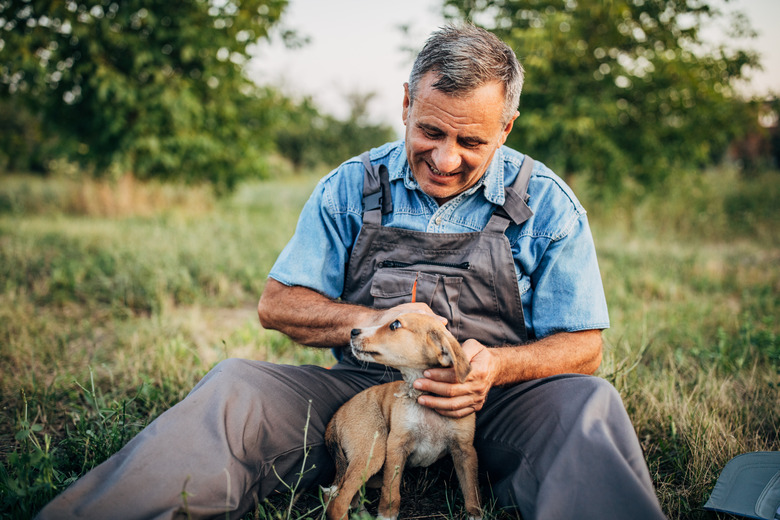Narwhal The "Unicorn" Puppy Absorbed His Twin, Probably
You may have seen that photo floating around the internet featuring a puppy with a tail growing out of its head. His name is Narwhal, and he's definitely a cutie – but according to some scientists, the reasons behind his forehead tail aren't quite so cute.
Narwhal's Backstory
Narwhal's Backstory
Missouri-based special needs dog rescue Mac's Mission took Narwhal in on Nov. 8 after someone spotted him on the street, and photos of the puppy went viral on Twitter about a week later. Rochelle Steffen, who founded and owns Mac's Mission, told TIME that the miniature face tail doesn't affect Narwhal's day-to-day life, and it doesn't need to be removed.
"It's like a Clark Kent hair swoosh," Steffen told TIME. "It's not in his way at all. It just stays right in between his eyes and has a little bit of curl under."
According to Steffen, the vet who initially examined Narwhal said it would be nearly impossible to pinpoint the scientific explanation for his extra tail. But Margret Casal, a professor at the University of Pennsylvania School of Medicine, told the New York Times that Narwhal's extra facial feature is most likely the puppy's parasitic twin.
A Twin Gone Wrong
A Twin Gone Wrong
Typically, identical twins form when a fertilized embryo splits in half. If the split takes place too late in a pregnancy, the twins may not fully separate. And sometimes, the embryo doesn't split in half at all – following an asymmetrical split, one side of the embryo becomes a fully formed individual, and the other turns into an extra body part.
Casal pointed out that the small mohawk of backward-growing fur above Narwhal's face tail resembles the crest on a dog like a Rhodesian ridgeback, potentially indicating a twin's backside on Narwhal's face.
The tail doesn't contain bones, either. This further supports Casal's theory, since according to her, the bottom of a spine can't develop bones unless it receives signals from the top of the spine. That said, identical twins among dogs are rare, making a dog with a parasitic twin "really super, super rare," as Casal told the New York Times.
Some More Narwhal Facts
Some More Narwhal Facts
The rest of Narwhal's litter has yet to be found, but staff at Mac's Mission are trying to track down the other puppies, according to reporting from Science Alert. They did, however, find an older dog whom they suspect may be Narwhal's dad.
Rescue workers believed Narwhal to be about 10 weeks old in mid-November, and Steffen said he resembles a dachshund mix, potentially with some golden retriever in him.
When Narwhal was rescued, he'd developed frostbite on two of his toes and required medication for worms. Otherwise, he was in great health. And nope – because his face tail doesn't contain bones, it cannot actually wag. Even so, Narwhal's social media fame has drawn attention to Mac's Mission, leading to an influx in adoption applications for other special needs dogs from the rescue.
"He's pretty perfect," Steffen said of Narwhal.
References
- New York Times: How Narwhal the 'Unicorn' Puppy May Have Grown a Tail on His Head
- TIME: 'It's Like a Clark Kent Hair Swoosh.' Here's What We Know About the Extra Tail on Narwhal the 'Unicorn' Puppy's Head
- Science Alert: This Adorable 'Unicorn' Puppy Has a Tail on His Face. Here's How That's Possible.
- Mac's Misson: Narwhal in the News Worldwide
Cite This Article
MLA
Swanston, Brenna. "Narwhal The "Unicorn" Puppy Absorbed His Twin, Probably" sciencing.com, https://www.sciencing.com/unicorn-puppy-mutation-13723202/. 26 November 2019.
APA
Swanston, Brenna. (2019, November 26). Narwhal The "Unicorn" Puppy Absorbed His Twin, Probably. sciencing.com. Retrieved from https://www.sciencing.com/unicorn-puppy-mutation-13723202/
Chicago
Swanston, Brenna. Narwhal The "Unicorn" Puppy Absorbed His Twin, Probably last modified March 24, 2022. https://www.sciencing.com/unicorn-puppy-mutation-13723202/
